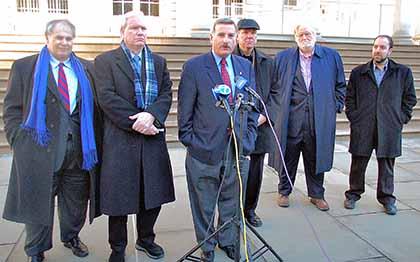By Rebecca Henely
State legislators and other community leaders in Queens and Brooklyn joined together on the steps of City Hall Sunday to protest a years-old potential plan of Mayor Mike Bloomberg’s to hike bridge and tunnel tolls for Manhattan-bound motorists.
“The administration’s latest traffic-pricing plan is nothing less than a disguised tax on all people of New York City,” said state Assemblyman Michael DenDekker (D-Jackson Heights).
Assemblyman David Weprin (D-Little Neck), DenDekker and state Sen. Tony Avella (D-Bayside), as well as representatives from Brooklyn Borough President Marty Markowitz’s office, the Queens Chamber of Commerce and the organization Keep NYC Congestion Tax Free protested the plan formerly known as congestion pricing and now referred to by the mayor’s office as traffic pricing.
Weprin described the plan as charging motorists $8 and truck drivers $21 to drive into Manhattan on weekdays from 6 a.m. to 6 p.m.
Lisa DelValle, a spokeswoman for Weprin, said while the plan had been originally proposed in 2007, the legislators raised the issue again because of news articles on the issue and reports private interests groups had been formulating a new proposal for congestion pricing, which DelValle said has not been formalized.
Marc LaVorgna, a spokesman for the mayor, said Bloomberg has not made any such proposal.
But the mayor unveiled a congestion pricing plan back in 2008, which was passed by the City Council but killed in the state Legislature when Assembly Speaker Sheldon Silver (D-Manhattan) refused to bring the legislation to the floor, citing a lack of Assembly support for the proposal.
Weprin said the mayor originally characterized the plan as one that would discourage cars from clogging the streets and thus decrease pollution, but Weprin said the plan had the potential to send those cars to the outer boroughs instead. The savings would have gone to improve subway and bus service.
“It would … negatively impact the environment and consequently pose a public health risk to the residents of many outer-borough neighborhoods that already see high levels of traffic and are major mass transit hubs,” Weprin said.
The legislators also contend the plan would put an undue hardship on commuters and small business owners. In a statement, Avella called the plan an “unfair and unnecessary” tax on those who do not live in Manhattan.
“It is not a viable option or solution for reducing traffic — it is merely a revenue-generating plan,” he said. “The reality is that nobody drives into Manhattan for the fun of it. People drive because they need to drive. We can’t allow this city and the MTA to continually balance their books on the backs of those who can least afford it.”
Most of those who spoke against the plan were from Queens, including Jack Friedman, executive director of the chamber, who called the plan a “business killer.” But the Queensites had an ally in Markowitz, who said in a statement the plan would penalize those who need to drive for their job or enter Manhattan on a regular basis for medical reasons.
“There has to be a more equitable plan that accomplishes our shared goals of cleaner air, reduced congestion and sufficiently funding our mass transit system,” Markowitz said.
Reach reporter Rebecca Henely by e-mail at rhenely@cnglocal.com or by phone at 718-260-4564.

































